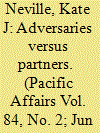|
|
|
Sort Order |
|
|
|
Items / Page
|
|
|
|
|
|
|
| Srl | Item |
| 1 |
ID:
105177


|
|
|
|
|
| Publication |
2011.
|
| Summary/Abstract |
n the Philippines, skepticism about private sector participation in urban water provision became increasingly pronounced as missed service targets and regulatory battles plagued governmental relations with the two companies (Manila Water and Maynilad) granted concessions for water provision in the capital, Manila. A comparative study of these two public-private partnerships (PPPs) reveals the challenges of reconciling bureaucratic and organizational dynamics with public suspicion of the private sector. This study draws on interviews and observations with corporate and government officials, academics, journalists, non-governmental organizations and civil society members in the Philippines, almost a decade after the initial privatization.
This paper furthers our understanding of the outcomes in Manila-and PPPs more generally-by addressing the tension between credible commitment in contractual arrangements and flexibility for responding to economic and environmental shocks. It argues that adversarial interactions between the private corporations and regulators hindered the collaborative negotiations needed to respond to the currency crisis. Fear of public backlash against price increases and contract adjustments prevented the government and companies from engaging in meaningful joint problem solving.
The differential outcomes of the companies illustrate the relevance of specific contractual arrangements and leadership in determining the impact of unforeseen shocks. However, the problems experienced by both companies indicates the need-if the private sector is to equitably and efficiently provide public goods-to redesign PPPs to increase transparency and to develop true partnerships.
|
|
|
|
|
|
|
|
|
|
|
|
|
|
|
|
| 2 |
ID:
090205


|
|
|
|
|
| Publication |
2009.
|
| Summary/Abstract |
Since the 2007 food crisis, controversy has engulfed biofuels. Leading up to the crisis, world-wide interest in these fuels-which include biomass, biogas, bioethanol, and biodiesel-had been surging as states increasingly saw these as a way to meet greenhouse gas reduction targets and promote sustainable economic development. Now some consumers, notably in Europe, are scaling back demand as they worry that biofuels are responsible for increased food prices and deforestation. In contrast, some states-particularly Brazil and the USA, the world's leading bioethanol producers-continue to promote biofuel development, especially in developing countries. Partnerships arising from these efforts, we argue, reflect new patterns in the international political economy, where trade relationships among developing countries are strengthening, and where economic lines between developed and emerging developing countries are blurring. Given previously observed patterns of resource exploitation involving complex webs of North-South and South-South trade (such as for resources like palm oil in Indonesia), we anticipate that the emerging political economy of biofuels will repeat and reinforce many of these same environmentally destructive trends.
|
|
|
|
|
|
|
|
|
|
|
|
|
|
|
|
|
|
|
|
|